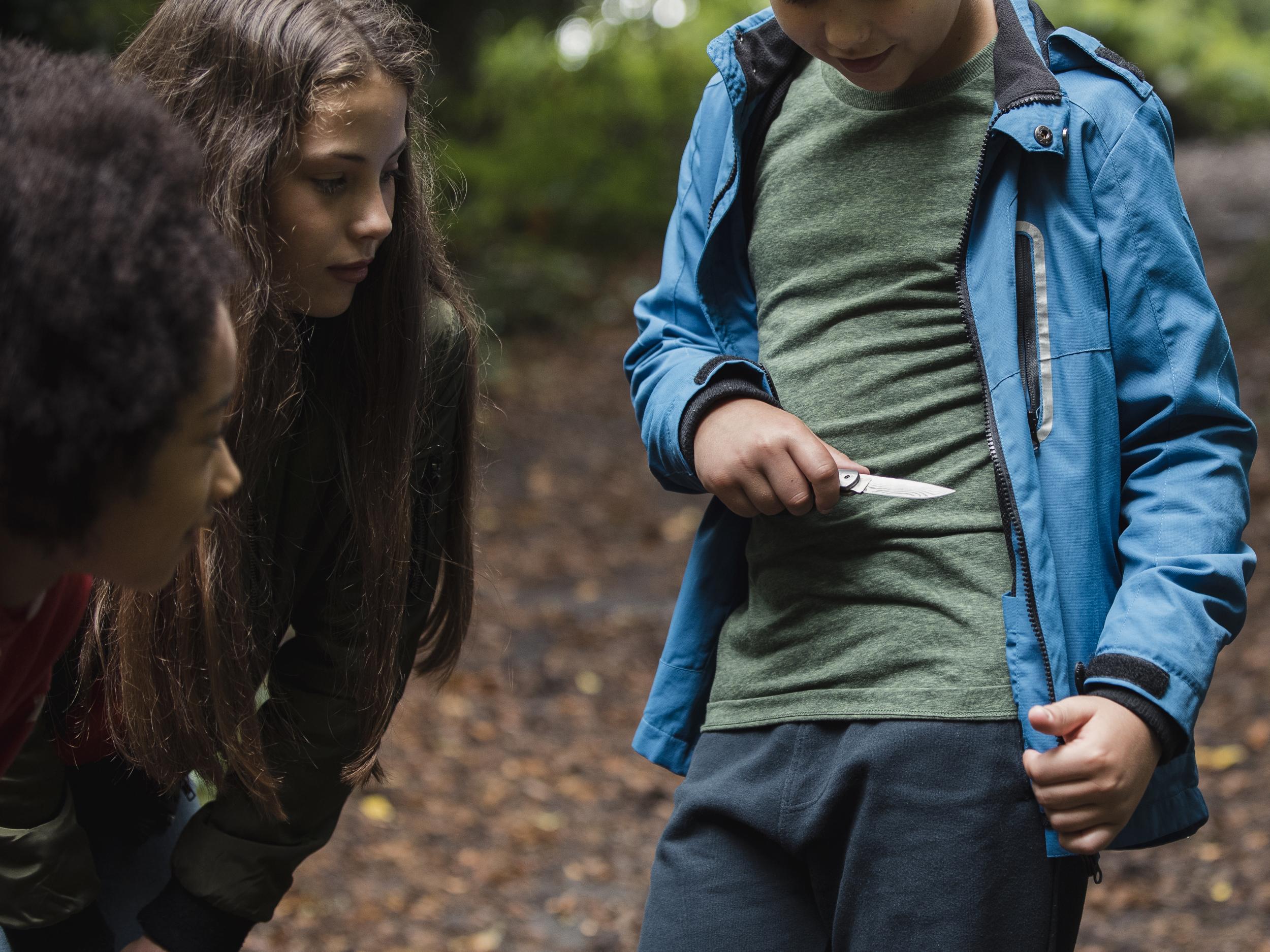Children as young as 9 carrying knives amid 'Wild West' violence in UK, police say
Number of 10 to 17-year-olds being admitted to hospital with stab wounds rising amid brazen daylight attacks

Children as young as nine are being caught carrying knives as parts of the UK are turned into the “Wild West” by violent attacks, a senior police officer has said.
Assistant chief constable Jacqueline Sebire said that after more than 20 years in policing, the past year has felt “completely different”.
“This level of violence, this constant torrent of every single day another stabbing, another violent incident that we can’t seem to get ahead of,” she told police chiefs and commissioners gathered at a conference in central London.
“There are children as young as 12 involved in stabbings. We have nine and 10-year-olds carrying knives.”
Ms Sebire, who is the National Police Chiefs’ Council (NPCC) lead for serious violence, played footage of two teenagers fighting with machetes at a Luton shopping centre while “people were pushing buggies past and toddlers were just walking around”.
She later told journalists that attackers appeared to be bolder and now commit stabbings and shootings in full view of CCTV and passers-by.
“It can be like the Wild West,” Ms Sebire said. “These attacks are happening in broad daylight, in public spaces, that’s what feels different. There are younger people involved who don’t necessarily appreciate the consequences.”
She added: “We have always had people shooting and stabbing each other but the increases and how sustained it is – it’s not peaks and troughs anymore, it’s just constant.”
Nick Hunt, head of the Home Office’s serious violence unit, said knife possession had risen by a fifth in a year, and knife crime overall by 12 per cent.
“Knife possession cautions for 10 to 17-year-olds has gone up particularly steeply,” he added. “Serious violence is being driven particularly by under-18s, which is a concern.”
In the last five years the number of NHS admissions by 10 to 17-year-olds with stab wounds has increased by 67 per cent.
And in the year to June, there were 69,000 incidents of child wounding across England to Wales and 29,000 child robbery victims.
Chief constable Mike Barton, the NPCC lead for crime operations, said police needed to target primary school children with prevention work.
“We need to redouble our efforts to look at seven and eight-year-olds, not 11 and 12-year-olds,” he said.
“This isn’t going to go away, it’s certainly an epidemic, it feels like a crisis.”
Rebecca Lawrence, chief executive of the London Mayor’s Office for Policing And Crime (Mopac), said that some teenagers were undergoing “emotional desensitisation” because of the number of murders in their areas.
The government released its first-ever serious violence strategy earlier this year and has invited police forces, councils and community groups to bid for funding for new projects as part of a “public health approach”.
But police officers at Thursday’s summit repeatedly raised concern about the impact of both cuts to policing and wider public services, like youth centres and children’s mental health.
Ms Sebire said that all agencies needed to get the response “right, right now”, or the trend of rising violence will continue.
Chief Constable Dave Thompson, of West Midlands Police, said that despite half of Birmingham’s population being under the age of 25 there are only two youth centres.
“When the government talks about early intervention in terms of violence it is absolutely right, but what is going to do it?” he asked.
Mr Thompson said the “fragmented” school system created by the Conservatives had made it harder to track and help excluded children, who are vulnerable to being drawn into crime and drug dealing.
He disagreed that Britain was now the “Wild West”, but said younger children were carrying knives.
“Some young people in some areas lead street-based lives that are incredibly violent,” Mr Thompson warned. “A lot more are carrying weapons in some inner city areas because they’re frightened and they feel insecure.”
He said the problem was exacerbated by social media, where members of rival groups taunt each other, because violent and threatening videos make children feel even more unsafe.
The senior officer said that while London has been hard-hit by violence, it is “not a capital city problem” and affects regions across the country.
Ms Sebire said that the past five weeks had seen three murders and five attempted murders in her home force of Bedfordshire.
“They have all got their foundations in drugs,” she said, after Home Office officials said changes to drug dealing and the increased purity of crack cocaine are among the causes of rising violence.
Between 2014-15 and 2016-17, murders where either the victim or suspect were known to be involved in using or dealing illicit drugs increased from half to 57 per cent.
